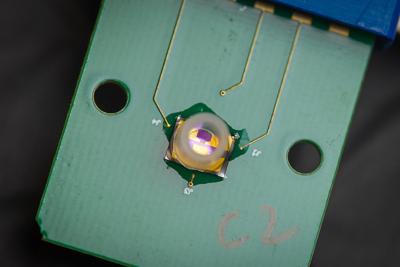An international team of researchers, including scientists from University of California San Diego, Chinese Academy of Sciences, University of Texas Medical Branch and University of Illinois Urbana-Champaign, has developed a handheld, non-invasive graphene-based device that can detect biomarkers for Alzheimer’s and Parkinson’s Diseases. The biosensor can also transmit the results wirelessly to a laptop or smartphone.
The biosensor consists of a chip with a highly sensitive transistor, made of a graphene layer that is a single atom thick and three electrodes–source and drain electrodes, connected to the positive and negative poles of a battery, to flow electric current, and a gate electrode to control the amount of current flow. Image credit: UCSD
The team tested the device on in vitro samples from patients. The tests reportedly showed the device is as accurate as other state-of-the-art devices. Ultimately, researchers plan to test saliva and urine samples with the biosensor. The device could be modified to detect biomarkers for other conditions as well.
